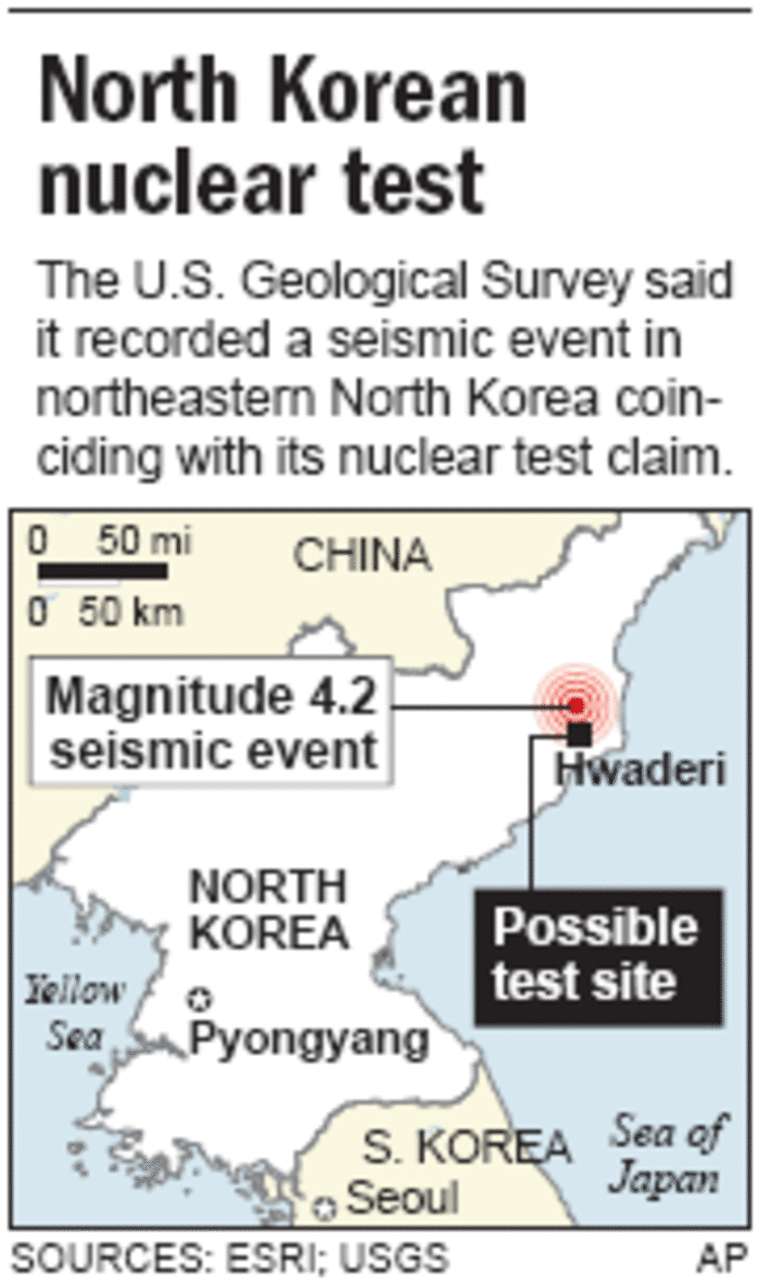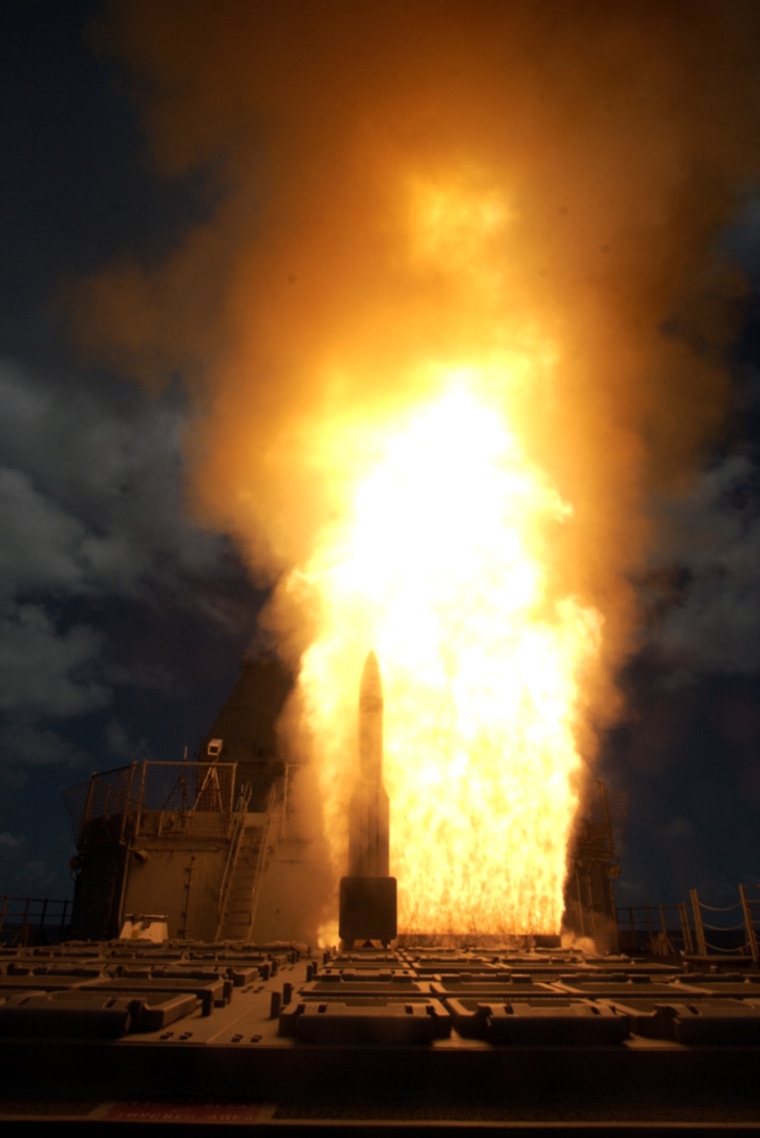The shock waves of the North Korean nuclear weapons test rumbled through the 2006 campaign Monday, with Democrats quickly seizing the chance to argue that President Bush and the Republicans had neglected the North Korean threat.
Bush had warned in his 2002 State of the Union speech of the menace from what he called the “axis of evil,” the regimes in Iraq, Iran, and North Korea. “I will not stand by, as peril draws closer and closer,” he declared. “The United States of America will not permit the world's most dangerous regimes to threaten us with the world's most destructive weapons.”
That speech created an expectation that the president might take military action against the North Korean regime, but Democrats charged Monday that Bush had let Korean despot Kim Jong Il continue his weapons building.
In New Jersey, Democratic Sen. Bob Menendez — in a tight race with Republican Tom Kean Jr. — issued a statement saying that the Korean nuclear test “illustrates just how much the Bush administration’s incompetence has endangered our nation.”
Charge that Bush ignored Korea
“We invaded Iraq, the country that didn’t have weapons of mass destruction, and ignored Iran and North Korea, the two that did,” Menendez said.
A potential 2008 Democratic presidential contender, Sen. Russ Feingold of Wisconsin issued a statement denouncing Bush for using the vehicle of six-nation talks involving China and Japan to try to persuade North Korea to forego its nuclear weapons ambitions.
Sunday’s nuclear test, Feingold said, showed “the weakness of the Six Party approach as well as the danger of this Administration's hands-off approach to North Korea.”
He added, “the stakes are too high to rely on others to address the North Korean crisis.”
Where Democrats usually criticize Bush for what they call a “go it alone” strategy in Iraq, on Monday some Democrats took the opposite tack, criticizing him for being too multilateral and not unilaterally negotiating with North Korea.
“Bush aided and abetted the outsourcing of American jobs, and now he’s outsourced our diplomacy as well,” Democratic National Committee chairman Howard Dean cracked.
Do Democrats need to offer specifics?
One question that remained unanswered in the first hours after the North Korean blast: In order for this issue to resonate with voters, do Democratic candidates need to recommend specific steps — such as a naval blockade of North Korea or increased spending on the Bush administration’s Ballistic Missile Defense System?
Or can they benefit this November merely by charging that Bush has neglected the Korean menace?
Most Democrats were not highly specific Monday about what they would do about Korea if they were in charge: Feingold called for the president to take “strong action with the international community to address this threat to our national security” — but he did not define what “strong action” he might have in mind.
Menendez said that Bush ought to “appoint immediately an independent envoy such as (former Secretary of State) James Baker or (former Defense Secretary) William Perry to oversee an international coalition to deal with this emerging crisis.”
Kean, Menendez’s GOP opponent, said in a statement that “we need to engage China, Russia, Japan and South Korea. We also need to continue to push for bilateral talks and look at strong sanctions before any sort of military action is taken.”
And Kean questioned Menendez’s national security credentials.
“Voters looking for a window into how Bob Menendez would deal with this type of threat should look at his record on national security,” said Kean. “If Menendez had his way there would be no Department of Homeland Security, national defense funds would be slashed, and the intelligence community wouldn’t have the tools they need to hunt terrorists.”
Republicans can point to some Menendez votes that show a dovish side: while a member of the House in 1996 he voted to freeze military spending, and the following year he voted to cut funds for B-2 bombers.
Key vote on missile defense
But he voted for the 1999 bill declaring that it was U.S. national policy to build a missile defense system to shoot down incoming missiles from North Korea or elsewhere.
Although most defense analysts doubt that North Korea right now has the ability to deliver a nuclear warhead with the missiles in its arsenal, the Kim regime has test fired several missiles toward Japan.
In that 1999 vote on building a national missile defense system, House Democrats were almost exactly evenly split, with 103 voting for it and 102 against it.
Among the Democrats voting against missile defense bill were Ohio Democratic Senate candidate Rep. Sherrod Brown and Minority Leader Nancy Pelosi, who would become speaker of the House if the Democrats win the majority next month.

Republicans also went on the offensive on the missile defense issue. The Maryland Republican Party criticized Democratic Senate candidate Ben Cardin for voting last May as a member of the House to cut spending on missile defense and to limit deployment of the existing missile defense system.
"Congressman Cardin’s reckless votes against a missile defense seek to weaken our security and put all Americans in danger," said Maryland Republican Party Chairman John M. Kane.
Democratic pollster Jeremy Rosner said “even the most partisan among us” see that the North Korean threat “is a serious enough issue that we should get some solutions to the problem and not just score points over it.”
He said, “People are looking to see if the Democrats have some ideas for how to pursue national security more effectively. You can’t just be all backbiting and negative.”
But Rosner said he did not think that “voters are necessarily looking for a six-point diplomatic strategy…. I don’t think you have to lay out a very detailed alternative plan.”
Rosner said several polls show that the public now sees the Democrats as being equally capable of handling national security as the Republicans. Until recently in most polls, Republicans enjoyed a large advantage in perception that they were stronger on national security than Democrats.
Are Democrats better equipped?
If the North Korean test has created an opening for Democrats to make the case that they’re better equipped to handle national security than the Republicans are, how do they prove that?
In Tennessee, Democratic Senate candidate Harold Ford Jr. pointed to 19 specific House roll call votes in which he voted for increased spending on a missile defense system and other military hardware.
He also noted that he voted for the 1999 bill declaring that it was U.S. policy to build a missile defense system.
Ford’s campaign used the North Korean test to ridicule his Republican opponent, former Chattanooga Mayor Bob Corker, for being a novice on defense matters.
Michael Powell, an advisor to Ford, said, “The mayor's complete lack of national security experience is showing when he says the U.S. should have relied on Russian and Chinese trade with North Korea to keep us safe from Kim Jong Il's nuclear ambitions.”
Corker campaign spokesman Todd Womack said Ford “offered no solutions to deal with this emerging crisis and what’s even more troubling is that, just a week and half ago, when it came time to vote on the defense authorization which included $9.4 billion for missile defense, Congressman Ford didn’t show up for work.”
Ford did indeed miss the vote in which the passed, 398 to 23, the defense spending measure.
